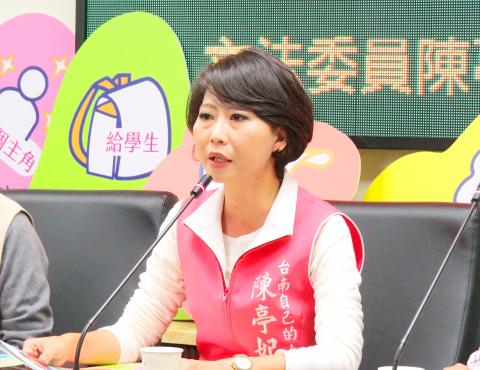Democratic Progressive Party (DPP) lawmakers yesterday proposed amendments that would stipulate prison sentences of three to 10 years for people convicted of spreading Chinese Communist Party (CCP) propaganda that is deemed to endanger national security.
The draft amendments to the Act Governing Relations Between the People of the Taiwan Area and the Mainland Area (台灣地區與大陸地區人民關係條例) was sponsored by DPP legislators Chen Ting-fei (陳亭妃), Chuang Jui-hsiung (莊瑞雄) and Su Chen-ching (蘇震清), and cosponsored by 16 other DPP lawmakers.
The bill says that no citizen, legal person, public or private corporation, organization registered in Taiwan or other entity should spread political propaganda from the CCP, the Chinese People’s Liberation Army (PLA) or the People’s Republic of China (PRC) government, or any political institutions or its agents, that would harm national security.

Photo: Tsai Wen-chu, Taipei Times
All such entities are prohibited from making any resolution, statement or joint statement that would negatively affect national security when attending any meetings held by the CCP, PLA or PRC government, it says.
All competent authorities are authorized to summon any person, organization or corporation for questioning should they have a factual basis to suspect them of breaking the law, it says, adding that if necessary, those entities should provide proof to corroborate their statements.
The bill stipulates a jail term of three to 10 years and/or a fine of up to NT$7 million (US$225,501) for contravening the regulations.
If summoned for questioning and the person, organization or corporation fails to attend, remains silent, gives a false statement or refuses to provide proof, they could face cumulative fines of between NT$100,000 and NT$1 million, the bill says.
The DPP lawmakers also proposed draft amendments to the Satellite Broadcasting Act (衛星廣播電視法), the Radio and Television Act (廣播電視法) and the Cable Television Act (有線廣播電視法).
Those amendments say that the government, citizens and affiliated groups of any country that is at war or in a state of armed standoff with Taiwan are barred from conducting business in the broadcasting industry and prohibited from holding the positions of manager, founder, shareholder, president or controller.
Whether a company has been broadcasting misinformation or failing to verify its sources should be a factor when competent authorities review requests to renew permits, the amendments say.

NATIONAL SECURITY THREAT: An official said that Guan Guan’s comments had gone beyond the threshold of free speech, as she advocated for the destruction of the ROC China-born media influencer Guan Guan’s (關關) residency permit has been revoked for repeatedly posting pro-China content that threatens national security, the National Immigration Agency said yesterday. Guan Guan has said many controversial things in her videos posted to Douyin (抖音), including “the red flag will soon be painted all over Taiwan” and “Taiwan is an inseparable part of China,” while expressing hope for expedited “reunification.” The agency received multiple reports alleging that Guan Guan had advocated for armed reunification last year. After investigating, the agency last month issued a notice requiring her to appear and account for her actions. Guan Guan appeared as required,

A strong cold air mass is expected to arrive tonight, bringing a change in weather and a drop in temperature, the Central Weather Administration (CWA) said. The coldest time would be early on Thursday morning, with temperatures in some areas dipping as low as 8°C, it said. Daytime highs yesterday were 22°C to 24°C in northern and eastern Taiwan, and about 25°C to 28°C in the central and southern regions, it said. However, nighttime lows would dip to about 15°C to 16°C in central and northern Taiwan as well as the northeast, and 17°C to 19°C elsewhere, it said. Tropical Storm Nokaen, currently

‘NATO-PLUS’: ‘Our strategic partners in the Indo-Pacific are facing increasing aggression by the Chinese Communist Party,’ US Representative Rob Wittman said The US House of Representatives on Monday released its version of the Consolidated Appropriations Act, which includes US$1.15 billion to support security cooperation with Taiwan. The omnibus act, covering US$1.2 trillion of spending, allocates US$1 billion for the Taiwan Security Cooperation Initiative, as well as US$150 million for the replacement of defense articles and reimbursement of defense services provided to Taiwan. The fund allocations were based on the US National Defense Authorization Act for fiscal 2026 that was passed by the US Congress last month and authorized up to US$1 billion to the US Defense Security Cooperation Agency in support of the

PAPERS, PLEASE: The gang exploited the high value of the passports, selling them at inflated prices to Chinese buyers, who would treat them as ‘invisibility cloaks’ The Yilan District Court has handed four members of a syndicate prison terms ranging from one year and two months to two years and two months for their involvement in a scheme to purchase Taiwanese passports and resell them abroad at a massive markup. A Chinese human smuggling syndicate purchased Taiwanese passports through local criminal networks, exploiting the passports’ visa-free travel privileges to turn a profit of more than 20 times the original price, the court said. Such criminal organizations enable people to impersonate Taiwanese when entering and exiting Taiwan and other countries, undermining social order and the credibility of the nation’s